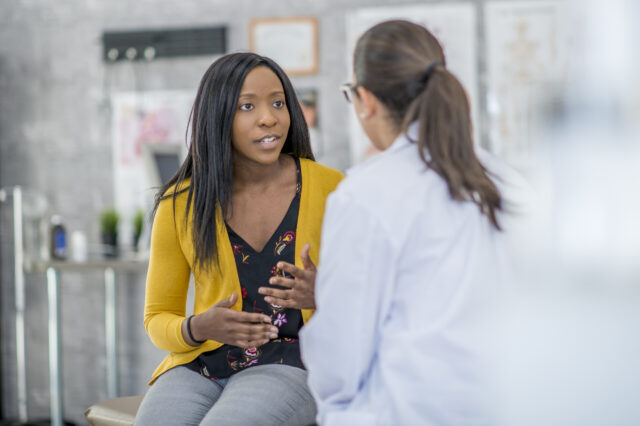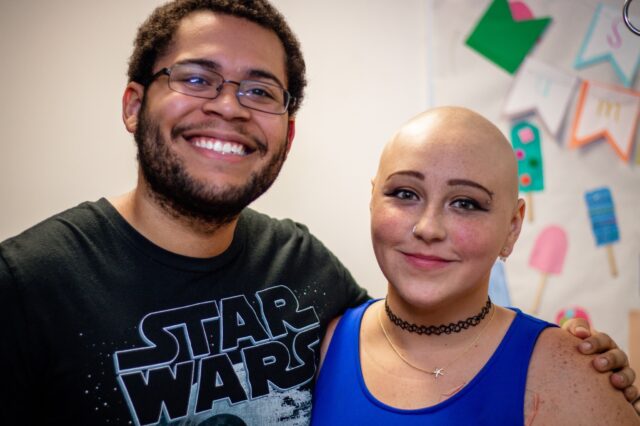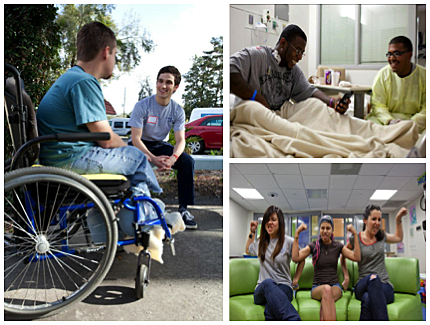Adolescent and Young Adult (AYA) Cancer Program
Who we are. Why we care.
Cancer is the most common cause of death in adolescents and young adults (AYAs) ages 15-39 years with approximately 80,000 individuals within this demographic being diagnosed annually. For treatment to be successful, extraordinary collaboration involving multiple scientific disciplines and medical specialties is required. Tragically, decreased access to specialized care, limited opportunities to participate in clinical trials, inconsistency in referral patterns, variation in treatment protocols and limited psychosocial resources are primary contributors to the poor outcomes associated with the AYA oncology population.
The UF Health AYA Cancer Program addresses the compelling and unique medical and psychosocial needs of our adolescent and young adult patients — from diagnosis to survivorship. This includes needs such as fertility preservation counseling, age-appropriate distress screening, psychosocial support, career/vocational resources, family-building options in survivorship, increasing access to clinical trial participation and multidisciplinary care. With this support, the UF Health AYA Cancer Program hopes to help break down the barriers to effective treatment commonly experienced by this distinct population, giving each person the best chance at beating his or her disease.
The Marshal Fisher Adolescent and Young Adult (AYA) Cancer Fund is named after Marshal Robert Fisher, age 17, who passed away on May 14, 2018 after a four-year struggle with a form of bone cancer called osteosarcoma. He had an abiding interest in nature, was an imaginative artist, creator and builder, and enjoyed being active. Marshal never met a stranger and always made the underdog feel appreciated. The fund supports creating and growing an AYA program that serves kids and young adults like Marshal in a variety of ways including: activities, education, psychosocial evaluation and support, financial assistance, fertility counseling, tools to assist survivorship, and more.
Coping With Cancer
When children or their loved ones are diagnosed with cancer there are psychological, social, emotional, and spiritual issues that may arise. Our licensed clinical social workers and other professionals work together to help overcome these hurdles and help patients and their families establish and maintain a “new normal” way of living.
These social workers and medical professionals are educated and skilled in assisting every AYA and their loved ones from the moment of diagnosis through the end of treatment, whether survivorship or palliative care. We have expert staff in both pediatric and adult sectors that offer a wealth of supportive services.
Program Objectives
Psychosocial Support
- Comprehensive psychosocial assessment (mood, coping, social support, family/work/school environment) and counseling at diagnosis, throughout treatment, and into survivorship
- Enhance patient and caregiver education by connecting to resources focused on how cancer may impact employment, education, social functioning, sexual health and mental health
- Provide assistance to patients transitioning back to school or the workforce
- Provide support for financial and legal challenges by referring to available resources, scholarships, and funding support
- Connect with peer support groups (Child Life Program and Certified Child Life Specialists (CCLS), Streetlight, Arts in Medicine, other AYAs) during and after therapy
Health Insurance Counseling
- Provide insurance education and guidance to prevent lapses in health insurance
- Provides advocacy regarding health insurance denials
- Provides links to insurance resources focused on providing further information regarding patient’s insurance, connecting to support communities and more
Fertility Counseling
- All AYA patients will receive fertility preservation counseling and resources in conjunction with UF Reproductive Endocrinology Institute prior to starting cancer treatment
- Confirms patient clearly understands the potential effects of treatment on their future fertility (and if not, educates them on how to get this information)
- Provides patient with links to fertility resources (financial, educational, support groups)
Clinical Trial Education and Enrollment
- Participate in active screening of local and national clinical trials in which AYA patients are eligible for enrollment to provide further access to treatment and improve future AYA patient outcomes
Palliative Care focused on needs of AYA population
- Assist pediatric patients who transition to adult care
- Assist with obtaining Advanced Directives
Survivorship
- Continue to provide support and coordinate the transition into a Long Term Survivorship Program
Contact Bianca Williams, the AYA Advocate/Social Worker, at (352) 265-6304 with further questions.
Improving How You Cope
While UF Health offers several avenues of support for those encountering all the hardships of cancer, there’s an abundance of information to consider and methods to employ that can optimize how you manage your illness.
Anxiety and Depression
Cognitive Behavioral Therapy Resources
- How to recognize/change negative thought patterns
- ABCT: Coping with cancer
- ABCT: Symptoms and treatments
Deep Breathing and Relaxation
General Wellness
Mindfulness
Suicide Prevention
Streetlight
Streetlight (Facebook) is a peer support program at UF Health Shands Children’s Hospital for people aged 13-25 living with cancer, cystic fibrosis, sickle cell and other chronic illnesses. Medicine goes a long way, but nothing can help quite like a friend, which can sometimes make a bigger impact than anything. Our Streetlight team — made up of 60-plus, college-aged volunteers — builds friendships through peer companionship to make sure you don’t fight this battle alone.
To request a visit from Streetlight, tell your nurse you’d like to see us or dial 50917 from your room phone.
Some of what we offer:
- Streetlight Gaming League: a virtual community of Streetlight patients, volunteers and staff who connect through chat and participation in online events. This community is accessed via the Discord app, which patients can access by phone, tablet, or computer.
- People around your age to hang out with who may have had similar hospital experiences
- Laptops and homework help
- Art materials and jewelry making
- DVDs and magazines
- Streetlight T-shirt and room visits
- Video games/systems
- Nail polish
- Guitars and other musical instruments
- Shands Spaces: a collage of your personal identity
- Teen lounge with pool, music, computers, and board games
- Support through personalized multimedia creative projects
Support Programs / Organizations
Some of the below organizations are not affiliated with UF Health, but offer potential support for patients. Besides the organizations listed below there are many other helpful programs and organizations which could provide assistance so please continue to find the resources that may work for you.
General Information
- Organizations serving AYAs (Financial, Support Groups, Fertility, Mental Health, and more)
- Stupid Cancer!
- Ulman Foundation
- Leukemia and Lymphoma Society
- CancerCare
Support Groups
Fertility
Financial Assistance
UF Health Shands/Gainesville
Resources
Some of the below organizations are not affiliated with UF Health, but offer potential resources for patients. Besides the organizations listed below there are many other helpful programs and organizations which could provide assistance so please continue to find the resources that may work for you.
- UF Health Psychosocial Resources (Pediatric Service Patients)
- UF Health Psychosocial Resources (Adult Service Patients)
- Resources (UF Health, Governmental, Lodging)
- Scholarship listing
News
Highlighted below are a few of the articles highlighting the experience and evolution of treatment for the AYA population.
- Why is colon cancer more deadly in patients under 25 years?
- AYA cancer survivors at higher risk for mortality, chronic conditions
- NYT: When the teenager, young adult has cancer
Events
Check back often for updates on upcoming events.
Clinical Trials
Clinical trials are essential for not only discovering new groundbreaking treatments for cancer, but also new ways to detect, diagnose, and reduce the chance of developing it. Clinical trials can show researchers what effectively does and doesn’t work in humans that cannot be learned in the laboratory or in animals.
Visit here to browse our clinical trials focused on AYAs and cancer.


